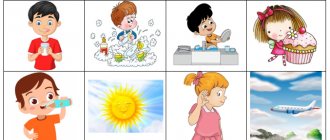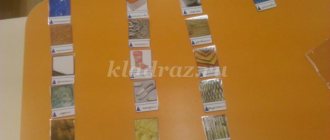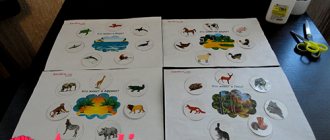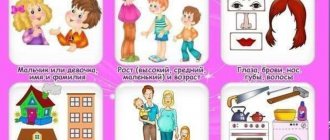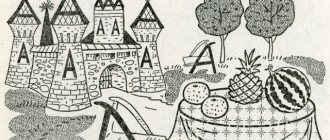Summary of the speech therapy lesson “Words-actions. Differentiation of words-objects and words-actions""
Shlygina Elena Yurievna
MBOU "School No. 11" Sarov, Nizhny Novgorod region.
Teacher speech therapist.
Summary of speech therapy classes in 1st grade.
Topic: “Words are actions. Differentiation of words-objects and words-actions.”
Student age: 1st grade, students with special needs levels 3-4.
Purpose: To learn to distinguish words denoting the action of an object.
Tasks:
Develop visual and auditory attention and memory;
Reinforce concepts about words denoting objects;
Teach children to graphically depict words denoting the action of an object;
Develop reading skills;
Equipment: Object pictures indicating living and inanimate objects; presentation for the lesson, individual cards with words.
Org. Moment.
Greetings. Setting up for the lesson.
- To talk, you need to pronounce,
- Everything is correct and clear, so that everyone can understand it.
II. Repetition.
The speech therapist invites students to come up with and name a word denoting a living and inanimate object, and pose a question for each word. Example: table - squirrel (What? Who?). Explain why this question was asked. Then the teacher offers to look at the pictures and select those that represent 1) living objects 2) inanimate objects. Put a question, depict the words graphically (with one line).
III.Work on the topic of the lesson.
— Guys, I suggest you think and say what the students do in class? Please answer in one word.
Children's answers: read, write, draw, cut out, sculpt, etc.
— The words you mentioned indicate actions. We will call them action words. Look at the blackboard. View slide.
- Tell me, what is the girl doing? What is the boy doing?
Children's answers: sleeps, eats, reads, writes, etc.
— Guys, what question have I asked you many times now? (what does it do?) Action words answer the question what does it do? We will denote action words in the diagram with two horizontal lines.
VI. Work in a notebook. I will name action words, and you will graphically depict them in your notebook. How will we depict them? (two lines). Words: jump, run, dance, etc.
- What words did I tell you just now? The children remember, we count who can name the most. How do we call these words in one word? (actions).
— The speech therapist offers the children the game “Draw or Imagine.” Guys, if you hear a word-object, draw a schematic picture in your notebook, and if you hear a word-action, then depict this word with a movement.
Words: apple, tree, knit, robot, sleep, swim, fence, sun, jump, cloud, star, read, smile.
- Well done! Did a great job! Tell me, what words did we distinguish in this game? What are their names? (objects and actions).
Speech therapy lesson on the topic: “Words denoting objects.”
Lesson No. 46
Topic: “Words denoting objects.”
Target:
Consolidate and repeat ideas about words denoting objects.
Tasks:
Educational:
- consolidate the assimilation of the lexical meaning of the word;
- promote the practical acquisition of words denoting living and inanimate objects;
- learn to ask questions to words-objects;
- learn to correlate words-objects with their graphic designation.
Correctional and developmental:
- correct logical thinking based on comparison of living and inanimate objects; auditory attention based on question discrimination;
— develop skills in sound and letter analysis and synthesis based on word transformation;
- develop the ability to select words for generalizing concepts;
- develop fine motor skills;
— to form the communicative side of students’ speech.
Educational:
- cultivate observation of linguistic phenomena, speech activity;
- cultivate perseverance.
Progress of the lesson:
1. Organizational moment.
- The one who guesses the word by its lexical meaning will sit.
A place where a lot of trees grow and you can pick mushrooms and berries. (Forest)
It's the time of year when apple trees bloom. (Spring)
A long break from studying for rest. (Holidays)
A building where children learn to read and write. (School)
The day on which the work week begins. (Monday)
2. Report the topic of the lesson.
— Today we are going on a space journey. We will fly to a distant planet, where we will study the characteristics of the local inhabitants.
— I have a ticket with the name of this planet. But there are pirates in space, and the name of the planet is encrypted so that the pirates won’t guess. However, smart guys will always be able to decipher it.
Sound analysis and synthesis:
- Name the first sound of each picture, say these sounds together and you will get the name of the planet. There are a number of pictures on the “ticket”: cheese, onion, donkey, mittens, watermelon.
- What happened? (“Words” - typed in letters of the cut alphabet.) “Ticket” is placed in the top row of the typesetting canvas.
“Now we know the name of the planet and we can hit the road.” - Open your notebooks. These are our logbooks. Indent 2 lines down. Write down today's date.
— We arrived on the planet of the Word. Look how many locals and tourists greet us. Let's determine which of them are the inhabitants of the planet
Carb Reading.
Waiting Table.
Telva Watermelon.
Vybmu Street.
- Read only the 1st column. Do you understand what is written here?
- What is this? (Set of letters
.)
- Read only the 2nd column. Do you understand what is written here? ( Words
.)
- Why do you understand the words, but not the set of letters? ( Every word has a meaning, words mean something.
)
3. Words denoting objects.
— The Planet of Words is divided into several parts. I don’t know which one we are in now. But the Words left us a clue. Look, there are letters in the envelope. I will put them in the second row of the typesetting canvas. Letter analysis and synthesis.
- Read it. Do you understand the meaning? What is this? ( Set of letters
.)
- Is it possible to form a word from these letters?
- What word did you get? (" items
»)
—What are the names of the inhabitants of this part of the planet? (“ words-objects
»)
On the speech therapist’s table there is a pen, a mirror, a notebook, and a textbook.
- Guys, give me the item. Is it possible to fulfill my request? Why? ( They didn’t name the item
.) Girl, come to me.
Is it possible to fulfill my request? ( No, because the girl is not named
.)
Conclusion: Every object has its own name, just like every person has a name.
Then the speech therapist names an object and asks the student to give it.
— We will denote words-objects with one stripe.
4. Physical education minute.
“Before we go further, I suggest you rest a little.”
- Complete each phrase, quickly choosing the right word. Count the number of words by bending your fingers.
- I know 5 dairy products...
- I know 5 names of birds...
- I know 5 deciduous trees...
- I know 5 wash supplies...
- I know 5 hats...
- I know 5 wild animals...
- I know 5 musical instruments...
- I know 5 sports...
- I know 5 names of insects...
5. Words denoting living and inanimate objects.
- So, we found out that words-objects live on the planet of words. But they are all very different. And these words need to be asked differently. Having seen one object, we will ask about it “Who is this?”, Having met another, we will ask the question “What is this?”
- This is because words-objects can be living and inanimate.
- Words denoting living objects answer the question... “Who?”
— Words denoting inanimate objects answer the question… “What?”
“Everything that moves on its own, eats, grows, is alive.” Inanimate objects cannot do all this.
- Let's get to know them better.
Working with cards.
— Draw a line from questions to objects.
6. Consolidation of knowledge on the topic.
1. - Words - objects invite you to play with the ball.
1st part of the game: while throwing the ball, the speech therapist names a word - an object - the child poses a question and determines a “living” or “non-living” object.
2nd part of the game: while throwing the ball, the speech therapist asks the question “who?” or “what?”, and the child must choose the appropriate word.
House - …? Who? - … Spoon - …? What? -...Mosquito -...? What? - … Snail - …? Who? - … Chair - …? What? - … Tiger - …? Who? -....
2. Game exercise “Walk in the forest.”
— On the planet of the Word, the forest is very similar to an ordinary terrestrial forest. Walking through the forest, we will make our way to our ship. On the way we will meet various objects and ask them questions “Who?” or “What?”
A panel depicting the forest and its inhabitants is exhibited.
7. Work on converting words.
- It's time for us to fly home. But in order to get on the spaceship, you need to complete a task: change the first sounds in words so that they answer the question “Who?”
— Write down a couple of words in your “flight logs.” ( Work at the board and in notebooks
).
Words: drop - heron, door - beast, poppy - cancer, house - catfish, donut - mouse.
Compose word combinations orally. Write down two of them. Underline the words-objects with one stripe.
8. Summary of the lesson.
- Here we are at home, on Earth. There are so many words around us.
- What words did you learn today? ( With words-objects
.)
- What did you learn about words-objects? ( That they are living and non-living
.)
— What questions are answered by living and inanimate words-objects? ( who what?
)
Summary of a correctional speech therapy lesson on the topic: “Words denoting a feature of an object”
Author-compiler: Speech therapist Ashmarina Irina Nikolaevna
Goal: to form a concept of words denoting a feature of an object.
Tasks:
Educational:
- to develop in children the ability to coordinate an adjective with a noun;
-enrich vocabulary.
Educational:
- develop coherent speech;
-develop visual-spatial coordination.
Educational:
- cultivate perseverance and attention.
Material and technical equipment: pictures on the topic, notebooks, pens, pencils, task cards.
Progress of the lesson:
Emotional-setting moment (emotional inclusion)
The speech therapist asks students what date, day of the week, month it is.
Corrective stage
Articulation gymnastics (depending on what sound or letter we are going through during the lesson) “Smile”, “Delicious jam”, “Shovel”, “Horse”.
Activity stage.
The speech therapist asks questions to the students:
- What is the weather today? (Frosty)
- Why frosty? (we see light patterns on the windows)
—What day is it like when the sun is shining? (Solar.)
- And when there is no wind? (Windless.)
Speech therapist: Let’s find out what day it is today. (The day is frosty, sunny, windless.)
How can we say about the weather, does it have the same symptoms? (The weather is frosty, sunny, windless.)
Development of visual-spatial coordination.
Speech therapist: Guys, please draw a Christmas tree in the lower right corner of the sheet.
Let's select words-signs for it. What Christmas tree? (green, fluffy, small).
Speech therapist: Please draw a cloud in the upper left corner.
Match the words that match the cloud. What is it like? (white, soft, light).
Speech therapist: Draw a sun in the center of the sheet. What sun? (yellow, warm, bright, beautiful).
Fizminutka:
We repeat all the warm-up movements without hesitation! Hey! They jumped on the spot. Eh! We wave our hands together. Ehe - heh! They bent their backs and looked at the shoes. Hey - hey! Bent down lower. Bent closer to the floor. Turn around in place deftly. We need skill in this. What did you like, my friend? Tomorrow there will be another lesson!
Development of phonemic hearing and phonemic awareness
Speech therapist: Listen to a series of words and name from this series words that denote the attribute of an object: sun, earth, warm, spruce, green, yellow, soft, sky, high, snow, fluffy.
Enrichment of the grammatical structure of speech.
Read the words. Connect words with opposite meanings with lines.
Working with cards.
| Hardworking | Kind |
| wicked | silent |
| talkative | lazy |
| soft | brave |
| cowardly | hard |
Emotional-reflective stage (evaluative).
- Today we got acquainted with the words that mean? – What did you find most difficult in the lesson? — Rate yourself and your mood (emoticons)
Share on social media networks
To My World
0
Tweet
RќСЂР°РІРёС‚СЃСЏ
I advise you to read more on this topic
- Lexico-grammatical exercises and speech games on the topic “Clothing”
- Norms for child speech development at 3 years old
- Games for the development of memory and speech in preschoolers. Part 1. Game “Remember the pictures”
- Summary of a speech therapy lesson for children with special needs on the topic “Transport”
- Using fables as a means of developing coherent speech in older children
